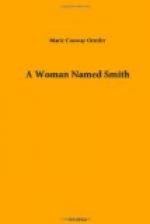And that’s how, on a sunny Wednesday afternoon, all Hyndsville came to Hynds House to hear Miss Emmeline Phelps-Parsons tell them “How to Reach the Women of the East.” Somehow, I rather think they were as curious about two Yankee women as they were about those Eastern women of whom Miss Emmeline was talking. I’m sure Hynds House was just as interesting to them as Mohammedan harems and Indian zenanas.
Miss Emmeline really spoke well, and her audience was interested in her, in her theme, and in Hynds House. The Suffragist picked up the thread where the less gifted woman dropped it, and in simple, living phrases drove home the great truth of the sisterhood of all women.
Which, of course, called for tea, and some of Mary Magdalen’s cookies. It was the cookies that caught The Author. Coming in from a long and hungry prowl, he spied Fernolia crossing the hall with a huge platter, got one tantalizing, mouth-watering odor, and dashed after her, bent upon robbery. A second later he found himself in a room full of women. Hyndsville was meeting The Author!
Alicia introduced him, pleasantly. And, “Talk about angels—” said she, gaily, “We have just this minute stopped talking about the heathen! And may I give you a cup of tea?”
“And a dozen or so cookies, please. Thank heaven for the heathen! What is home without the heathen?—Without sugar, Miss Gaines, without sugar! And for charity’s sake, no lemon!”
He sipped his tea and munched his cookies, with his head on one side and the air of a thievish jackdaw; and proceeded, after his wont, to extract such pith as the situation offered.
“Doctor Johnson,” Miss Martha Hopkins remembered, as she watched him drinking his fourth cup of tea, “Doctor Johnson was also addicted to tea-drinking. Most great literary men are, I believe.”
“It isn’t possible you consider old Johnson a great literary man!” The Author’s eyebrows climbed into his hair.
“Why! wasn’t he?” Her eyes widened. She had as much respect for Dr. Johnson as Miss Deborah Jenkyns had, though of course she never read him. Life is too short.
“Why! was he?” asked The Author. “Outside of Boswell—and he was a fool—I’ve never known anybody who thought he amounted to much.”
The Suffragist looked up. “Nelson had his Southey, Boswell had his Johnson, and Mr. Modern Best-seller may well profit by their example.” And she smiled grimly.
The Author’s lip lifted. “Oh, but you couldn’t do it!” he purred. “And if I offered you the job you’d excuse your incapacity on the ground that there wasn’t anything to write about. I know you!” He took another cooky.
“Yes, I dare say I’d blurt out the truth. Women are like that,” admitted The Suffragist.
“The female of the species is more deadly than the male,” conceded The Author. “Nevertheless,” he raised his tea-cup gallantly, “To the ladies!” He got up, leisurely. “And now I go,” said he, “to paint the lily and adorn the rose. In short, to set forth in adequate and remunerative language the wit, wisdom, virtue, beauty, and ornateness of woman as she thinks men think she is. Nature,” reflected The Author, smiling at The Suffragist, “made me a writer. The devil, the editors, and the women have made me a best-seller.” And he departed, a cooky in each hand.




